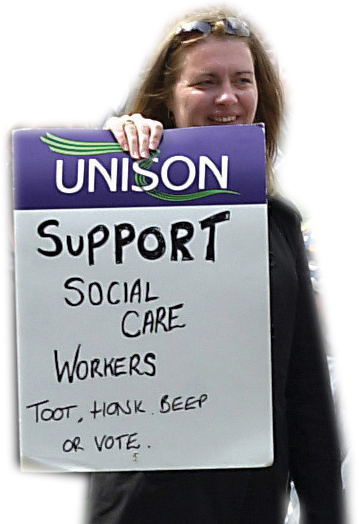Low wage Britain
Little charity from high paid care bosses
A care worker
Five million workers in Britain are on low pay. I’m one of them.
In 2005 I was transferred from the NHS to one of a group of companies owned by a not-for-profit charity. It was also ‘not-for-union recognition’, although those transferred did stay in Unison.
In 2013 I was on £8.50 an hour for supporting people with learning difficulties and challenging behaviours. If I did overtime, night work, unsocial hours and bank holidays I got an enhanced rate. I got six weeks holiday too.
But then a restructure ‘harmonised’ our contracts with the non-transferred workers. Our hourly rate was to be cut to £7.59 for all shifts with no enhanced rates. Holidays were cut to four weeks. Some of us went on strike.
The companies made a total surplus of over £2 million in 2012-13, which they gave in gift aid to the parent company with no tax paid. Four executive directors were on over £100,000 a year!
Determined strike
Many people had never been on strike before but were determined to fight. Some already on £7.59 also struck, but sadly we did not win over enough of them, as management used divide and rule tactics. But I still think that had the strike gone on, more would have come out on strike.
However we lost, not through lack of determination, but the union regional officials let us down and called it off. At one point we had the bosses on the run, they had to bring in management from other areas.
A couple of months later the company gave us a pay rise, from £7.59 to £7.66 an hour. It was not much, but better than nothing. The company had said we would not get a rise till 2016!
We also won extended pay protection from 12 to 18 months, but that protection comes to an end at the end of November. So I will be taking a lot less home in December.
I am trying to campaign for union recognition as we recruited a lot during the strike, but it is difficult to recruit more now as a result of the union officials’ action. There is still a lot of demoralisation.
Now rumour has it that the company are cutting again. Many of the people we support need two-to-one support. However, social services now want one-to-one support.
This will affect’s clients’ activities and quality of life. But it also puts staff at risk as many clients have very challenging behaviour. Staff could also lose their jobs.
They also want to change waking nights to sleep-ins, expecting staff to sleep in corridors on a flat bed. Why pay an hourly rate for a waking night when you can just pay £22 for a sleep in?
Labour have promised an £8 minimum wage, but not until 2020! We need £10 now!
The Socialist Party says:
- Stop the care cuts
- Take council and NHS care back in-house
- £10 minimum wage now – no exemptions
- Scrap zero-hour contracts
Life of a zero-hour care worker
A day in the life of many care workers working for charities on zero-hour contracts can involve:
- Sitting at home watching crap TV while waiting for a call that doesn’t come
- Taking a ticket at the council offices and waiting half a day to sort out your housing benefit even though you lose a day’s pay in the process
- Trawling the internet for a care job with a proper contract
- Being shunted from place to place and pretending to be happy, lest a grumpy face loses you shifts
- Or being at work and seeing that the very people you work with and for are also being done over
I know, I’ve been there and dread going back. Like so many, the Con-Dems’ recession led me from a half-decent job to zero hours via the soul destroying Jobcentre Plus.
Many are doing two jobs because the charity claims it cannot pay a living wage. I ended up getting an hourly rate that I wouldn’t have got out of bed for in 1999.
But charity chief executives regularly get £100,000 plus expenses with their entourage not far behind. No wonder that a recent poll showed 35% of people have little trust in charities.
Benefit cuts
Vulnerable clients are also getting whacked with their benefits being cut. New Personal Independent Payments actually mean personally restricting their lives: more stress and isolation for them with less respite for their carers.
Zero hours means you’re permanently skint. Most staff couldn’t afford to attend last year’s Christmas do at £25 a head – that’s over half a day’s pay.
The only saving grace in three years of zero-hours working was my fellow workers and the vulnerable people I worked for. Socialism cannot come quick enough for them.









